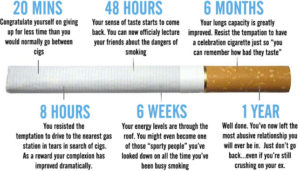The Effects Of Quitting Smoking
Start Almost Immediately
A Personal Timeline
According to the website Smokefree.gov, smoking harms nearly every organ of the body, and secondhand smoke is dangerous to anyone who breathes it in—even secondhand smoke has more than 7,000 harmful chemicals, at least 250 of which are known to damage your health. Quitting can undo a lot of the damage done to the smoker and can safeguard loved ones in their home.

In 20 minutes: Your heart rate and blood pressure drop.
In 12 hours: The carbon monoxide level in your blood drops to normal.
In 2 to 12 weeks: Your circulation improves and your lung function increases.
In 1 to 9 months: Coughing and shortness of breath decrease as the cilia (tiny hair like structures on the surface of the cell) in your lungs start to regain normal function to clear mucus and reduce the risk of infection.
In 1 year: Your risk of coronary heart disease drops to half that of someone who smokes.
In 5 years: Your risk of mouth, throat, esophagus and bladder cancers is cut in half. Your cervical cancer risk is about equal to that of a non-smoker. Within 2 to 5 years, your stroke risk should fall to that of a non-smoker.
In 10 years: Your risk of dying from lung cancer is about half that of a smoker. Your larynx (voice box) and pancreatic cancer risks decrease.
In 15 years: Your risk of coronary heart disease is now equal to that of a non-smoker.
Long-term: Quitting also lowers your risk of diabetes and boosts heart health and lung health in many ways. The younger you are when you quit, the greater the benefits to your health, but quitting at any age can give you years of life that will be lost if you continue to smoke.
Resources: Quit.org.au and Quit Smoking Community.org
Learn More About Sticking With Your No Smoking Plan












